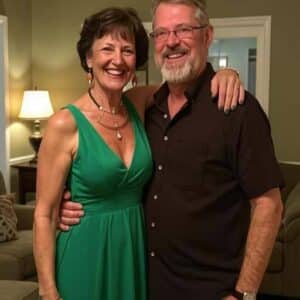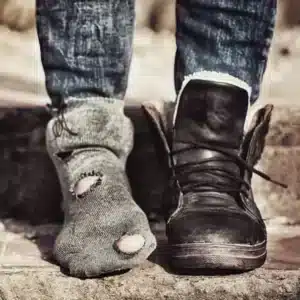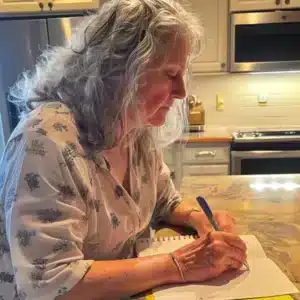I spotted her in my headlights—one hand raised, the other pressed to her belly—standing on the shoulder of the highway in a shimmer of scarf and dress. By the time I pulled over, the pain had bent her in half.
“Help me,” she gasped.
“I’m a doctor,” I said, already kneeling. “Tell me your name.”
“Miranda.” Another contraction seized her. “The baby… now.”
There was no time to get anywhere. The road was empty, the sky low and dark. Muscle memory took over—steady breaths, firm instructions, a towel from my trunk. Minutes later, a thin cry cut the night. I wrapped the girl and handed her to Miranda, who cradled her with a look that was half awe, half terror.
“Hospital?” I asked.
She shook her head fast. “I left my husband. If I walk into a hospital, he’ll find me. Please.”
I hesitated. It had been two years since my wife died and six months since my daughter’s broken leg; the house was already full of grief and noise. But Miranda’s arms tightened around the newborn, and the plea in her eyes made the decision for me.
“I have a guest room,” I said. “A few days. Then we’ll figure out next steps.”
“Thank you,” she whispered.
At home, I showed her the room and brought a sandwich while she nursed. Between bites, she told me the thinnest version of her life—fairs, palm readings, the kind of fortune telling that covers rent and not much else. She didn’t say much about the man she was running from. She didn’t have to. Exhaustion pulled her under mid-sentence.
I checked the locks, peeked in on my daughter—Sarah, six—then collapsed. I meant to sleep in. Instead, I woke to a quiet that felt wrong.
Sarah’s bed was empty.
Her crutches leaned against the wall. Her stuffed rabbit lay on the floor. My heart slammed into my ribs.
“Sarah?” I called, moving through the hall, the kitchen, the living room. Nothing. A cold dread swept over me as I reached the guest room and knocked.
Miranda sat on the edge of the bed, humming. Sarah was tucked at her side, the newborn curled against Miranda’s other arm. In the dim light, it looked like a picture I hadn’t let myself imagine.
“What are you doing?” My voice came out more raw than I meant.
Miranda lifted a finger to her lips. “She was crying,” she whispered. “Calling for her mom. I heard her and went to check. She took my hand and wouldn’t let go.”
I stepped closer. Sarah’s face was slack with sleep, tear tracks drying on her cheeks.
“I told her a story from my grandmother,” Miranda said. “About a guardian who watches children’s dreams and chases away the scary bits. She calmed down. I didn’t want to leave her alone.”
Relief hit so hard my knees went weak. Sarah had been drifting at night ever since the accident and, before that, since we lost her mother. My voice softened.
“Thank you,” I said. “She… misses that kind of comfort.”
Miranda nodded. “I know what it is to miss the person who makes the dark less dark.”
We stood there listening to the tiny sounds babies make, each of us trying not to break the moment. Something in me—tight for months—loosened a fraction.
“If you want,” I said, “you can stay a little longer. Until you’re steady. It might be good for her.”
“If you’re sure,” she said, the relief almost a smile. “I’d like that.”
Sarah stirred, blinked up at me, then turned to Miranda. “She told me about a guardian,” she murmured. “He keeps the nightmares away.”
“You were brave,” Miranda told her.
Sarah’s shy smile cracked something open in the room. “Will you tell me more?”
Miranda glanced at me. I nodded. “As many as you want.”
The day remade itself around that quiet agreement. Miranda slept when the baby slept; I made pancakes and burned half of them; Sarah watched from the counter as if it were a magic trick. Later, Miranda sat on the couch and fed her daughter while Sarah leaned against her shoulder, asking a hundred small questions about guardians and grandmothers and what babies see when they dream.
I learned the outlines in bits: the man who had promised love and delivered fear, the nights on the road, the way carnival work can keep you moving when staying still is dangerous. She never asked for money. She washed dishes, folded laundry, and thanked me more than I deserved.
At night, when the house went soft, she hummed. Sometimes I’d stand in the hall and listen to Sarah’s breathing slow beside hers. It was the most peace I’d heard in months.
I took the baby to my clinic for a quiet check—weight good, lungs strong. I talked to a social worker I trusted about safe options and protections, about how to put legal distance between Miranda and the man she’d left. It was practical, necessary, and not at all the heart of the thing.
The heart of the thing was a story, told in the dark, by someone who understood how fear lives behind the eyes. It was my daughter’s hand tucked into a stranger’s palm in the middle of the night and the way she slept after. It was the ache in my chest when I realized how much comfort we’d both been missing, and how unexpectedly it had arrived.
One evening, after dinner, Sarah fell asleep on Miranda’s lap. I lifted her carefully, her head heavy on my shoulder. Miranda watched me with a look that was not pity, not need, just quiet recognition.
“Thank you for stopping,” she said.
“Thank you for waving me down,” I replied.
The newborn made a soft sound, and Miranda smiled down at her. “She needs a name,” she said. “Something that means safe.”
“Call her whatever tells the truth,” I said.
Outside, the streetlight buzzed. Inside, the house felt lighter, like someone had opened a window in a stale room. I found myself hoping for ordinary things again—morning coffee that didn’t taste like grief, a day without that electric thread of fear in the air, a night where everyone slept until the sun.
Miranda stayed. Not forever, not in a way that felt like running, but long enough for paperwork to clear and for her to learn our kitchen and for Sarah to memorize every twist in the guardian’s tale. Long enough for a new shape to take root in the house—one made of three different losses, lined up against the dark and deciding, together, not to let it win.
Sometimes shelter is a roof and a door. Sometimes it’s a story whispered at 3 a.m. by a woman who’s done her share of whispering to survive. Either way, the morning looks different after.





